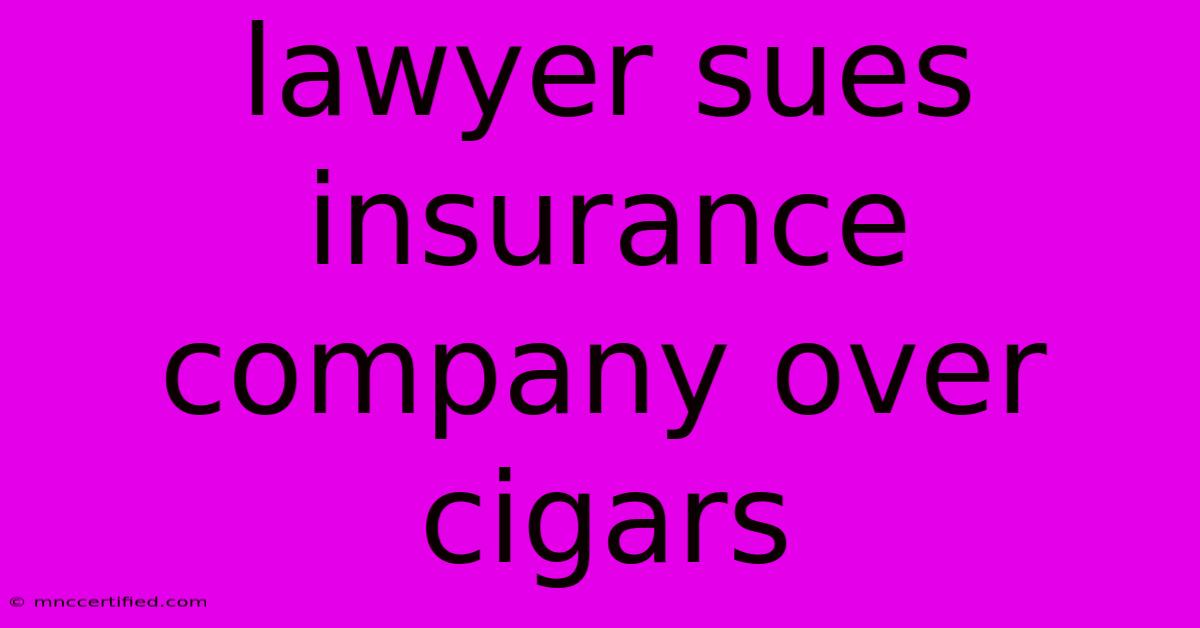Lawyer Sues Insurance Company Over Cigars

Table of Contents
Lawsuit Claims Insurance Company Denied Coverage for Cigar-Related Cancer: A Tale of Tobacco and Legal Battles
A recent lawsuit filed in [Court Location] raises questions about insurance coverage and the long-term health risks associated with smoking cigars. The plaintiff, [Plaintiff Name], alleges that his insurance provider, [Insurance Company Name], wrongfully denied coverage for his cancer treatment, claiming the illness stemmed from his long-time cigar smoking habit.
This case highlights the ongoing debate about insurance policies, pre-existing conditions, and the accountability of tobacco companies.
The Plaintiff's Case: A History of Cigar Smoking and Cancer Diagnosis
[Plaintiff Name] has been a cigar smoker for [Number] years, a habit he claims he developed during [Explain how plaintiff started smoking cigars]. In [Year], he was diagnosed with [Type of Cancer] and began treatment. However, when he submitted his insurance claim, [Insurance Company Name] denied coverage, citing his history of cigar smoking as a pre-existing condition.
[Plaintiff Name] argues that [Insurance Company Name] is unfairly using his smoking habit to avoid paying for his medical bills. He contends that [Explain plaintiff's argument about insurance contract and/or pre-existing condition clause]. He also emphasizes that his cancer is not directly linked to his cigar smoking and that other potential factors could have contributed to his illness.
The Defendant's Response: Cigar Smoking as a Pre-Existing Condition
[Insurance Company Name] maintains that [Plaintiff Name]'s cancer diagnosis is directly related to his long history of cigar smoking. They point to [Explain Insurance Company's arguments and any relevant policy clauses].
The company also argues that [Plaintiff Name] was aware of the potential health risks associated with smoking cigars and that he should have been aware of the possibility of a denial based on pre-existing conditions.
The Larger Issue: Insurance, Tobacco, and Health Risks
This case goes beyond a simple dispute between an individual and an insurance company. It raises critical questions about the responsibility of insurance providers in covering health conditions linked to tobacco use.
Here are some key points to consider:
- Pre-existing conditions: Are insurance companies justified in denying coverage for illnesses linked to pre-existing conditions like smoking? How does this impact individuals who struggle with addiction and are seeking treatment?
- Transparency in policies: Are insurance policies clear enough regarding pre-existing conditions and coverage limitations? Do individuals understand the potential risks associated with smoking when they sign up for insurance?
- Tobacco industry liability: Should the tobacco industry bear greater responsibility for the health consequences of smoking, including the financial burden on insurance companies and individuals?
What to Watch For: The Outcome and its Implications
The outcome of this lawsuit will have significant implications for future cases involving insurance coverage for smoking-related illnesses. If the plaintiff is successful, it could set a precedent for greater accountability for insurance companies and increased coverage for individuals diagnosed with tobacco-related conditions.
The case is also likely to spark further debate about the role of the tobacco industry and its responsibility to address the health consequences of its products.
This is a developing story, and we will continue to monitor the case closely as it progresses.

Thank you for visiting our website wich cover about Lawyer Sues Insurance Company Over Cigars. We hope the information provided has been useful to you. Feel free to contact us if you have any questions or need further assistance. See you next time and dont miss to bookmark.
Featured Posts
-
How Much Are Dental Bridges With Insurance
Nov 07, 2024
-
The View Trumps Win Sparks Debate
Nov 07, 2024
-
Insurance For Animal Rescue Organizations
Nov 07, 2024
-
How Much Is Acl Surgery Without Insurance
Nov 07, 2024
-
Ford Motor Company Retiree Life Insurance
Nov 07, 2024